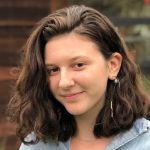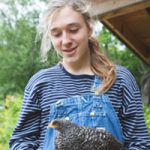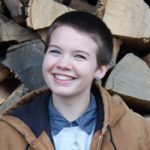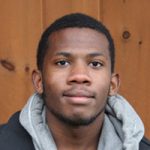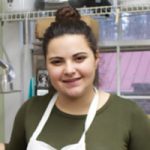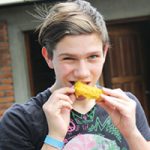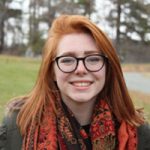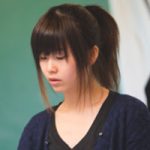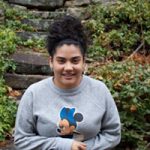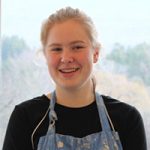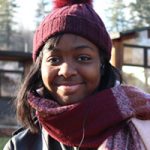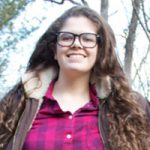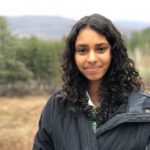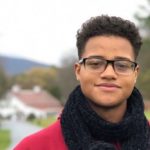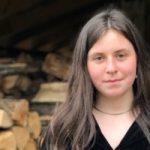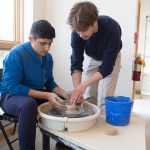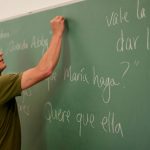English
he goal of Buxton’s English curriculum is to create engaged readers, writers and thinkers. We want students to respond honestly and intelligently to literature, to grasp the exciting and innovative ideas that great writers put forth, to learn to analyze and interpret texts, and to translate their own ideas into powerful, thoughtful writing. All Buxton students take four years of English, during which time they read, discuss, and write continuously, always in close conjunction with their teachers and peers. They actively participate in the process of understanding and making literature, approaching great books openly and thoughtfully in the spirit of curiosity and with a will to learn. We expect that the habits of engagement that students acquire in their English classes will cross over into all aspects of their lives.
The two facets of the English program—the teaching of great literature and writing skills and the building of community within the school are meant to be overlapping and complementary. Students simultaneously engage with literature and the world in which they live.
In this workshop-style class, students will read and listen to a wide array of poetry (from sonnets to spoken word) and compose original poems. Students will experiment writing in different forms and styles and responding to generative writing prompts: writing odes to everyday objects, crafting poems inspired by visual art, and making verbal collages. Writing workshops will be devoted to careful consideration and discussion of each student’s work.
In this class students will explore the genre of creative nonfiction with particular focus on lyric essays. Students will read and write lyric essays and will go on excursions that aim to inspire their writing and help them create a collage of experience to weave in and out of within the form. The main text we’ll be reading from is Maggie Nelson’s Bluets.
This course is an introduction to the infinite possibilities and pleasures of literature. We will, first and foremost, consider a selection of contemporary novels, classic texts, and short stories individually and in relation to each other. These considerations will be of a literary, social, historical, and personal nature. Through these analyses, students will have the opportunity to improve their writing, reading, and speaking skills, learning to critically interpret and articulate their own ideas effectively in careful inquiry and personal response to the topics at hand. Further, the class is a unique chance for the entire grade to learn about and from each other over the course of the year, getting to know one another personally and intellectually in their first year at the school.
This English II section, entitled “Speaking Truth to Power,” will explore the meanings of the words “truth” and “power.” Who decides what is true? If all information contains bias, then how do we decipher truth? How does power affect our access to truth? Authors and writers have the power to create and present truthful narratives that illuminate the many ways of seeing and interacting with our world. Through critical reading and writing, exploratory projects, and group discussion, students will sharpen their skills as truth-tellers. We will explore the works of authors including James Baldwin, Elie Wiesel, Nayyirah Waheed, Chimamanda Ngozi Adichie, Arundhati Roy, Alison Bechdel, Octavia Butler, and more.
We begin in the fall with a close reading intensive. We interrogate the mechanics of language in works of microfiction and poetry, learning to identify and describe the careful choices involved in constructing a text. In the winter, we bring our close reading skills to bear on the everyday language recorded in Studs Terkel’s Working. Our interest here is both specifically literary and broadly humanistic: how does language reflect the realities of life at work? How does a person’s experience at work inform and shape their idea of the self moving through the world? Students are encouraged to get curious about the interplay of necessity and choice involved in working life, and to begin to envision how they might navigate working life when school comes to an end. In the spring, English III takes a turn towards rhetoric and the art of persuasion. We will read excerpts from Aristotle, Cicero, and Quintilian, investigating the classical art of rhetoric and learning to identify and use basic rhetorical figures. Our unit on rhetoric will culminate in a powerpoint party, in which groups of Juniors will have an opportunity to persuade the rest of the student body on a wide array of topics ranging from the frivolous to the existential. Finally, we will all decide on a short novel to read together to bring the year to a close. Throughout the year, Juniors are also hard at work on Junior Thesis— a research-based project that gives each student the opportunity to take a deep dive into a topic of their choosing. Students receive guidance and instruction on some of the nuts-and-bolts aspects of research, including note-taking and citation practices.
Seniors will choose one of two electives offered each semester, each taught by a different teacher. These courses will continue to develop, on a more advanced level, many of the theoretical and aesthetic ideas explored in the previous three years. Student writing, class reading, and discussion are at the center of the courses.
THE ART OF LOSING
The Art of Losing
It’s evident
the art of losing’s not too hard to master
though it may look like (Write it!) like disaster.
–Elizabeth Bishop, “One Art”
How do writers—even masters of the craft—wrestle language into a form that can describe significant personal loss? What tools are at the disposal of a writer who is grieving? This class will examine various texts—personal essays, poems, memoir and autobiography—to explore this question. We’ll read writers who look at death by juxtaposing it against something else: Cheryl Strayed, who pairs the death of her mother with the beginning of her heroin addiction, and James Baldwin, who examines his father’s death alongside the Harlem race riots. We’ll a read a book that approaches death by breaking all the rules, even blurring the lines between fact and fiction: Dave Eggers’ memoir A Heartbreaking Work of Staggering Genius, in which Eggers chronicles his experiences raising his 8-year-old brother after the sudden deaths of both his parents. Finally, we’ll see where a writer’s tools seem to fail, where death can only be discussed through fragmentation and the breakdown of form: Joan Didion’s Blue Nights, about the death of the author’s daughter. Throughout the semester, students will work on creative pieces that experiment with juxtaposition, rule-breaking, fragmentation, and other tools that can stretch our own abilities with the written word.
ON THE MARGINS: REBELS, OUTLIERS, AND OUTCASTS
In this senior English seminar we will be looking at books about those who live at the margins of society. Starting with short stories and moving on to novels and plays, we will read works that examine, expose, even celebrate those on the edges: immigrants, dreamers, fanatics, prophets, the oppressed. The primary texts for the course will be The Metamorphosis, by Franz Kafka (the bizarre tale of a man who becomes a cockroach), Wise Blood, by Flannery O’Connor (a Southern Gothic text so strange it boggles the mind), The Brief Wondrous Life of Oscar Wao, by Junot Diaz (a wild, exuberant, and sad novel about a self-described “ghetto nerd” from the Dominican Republic), and the play Angels in America, by Tony Kushner (an epic and elegiac “gay fantasia in five acts”). We will be focusing not just on content but also on technique: how do these writers write their stories? How do their choices affect meaning? etc. Students will also be doing a lot of their own writing, both in and out of class. We will have frequent in-class creative and expository exercises as well as longer out-of-class papers that are both creative and analytical.

